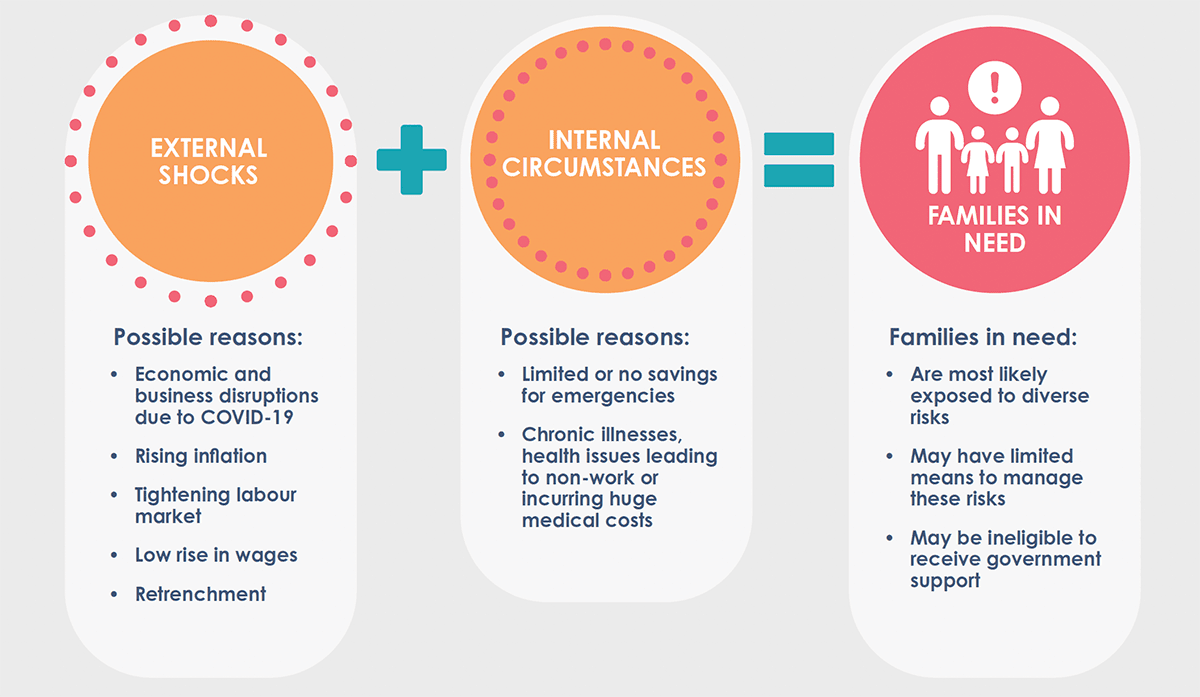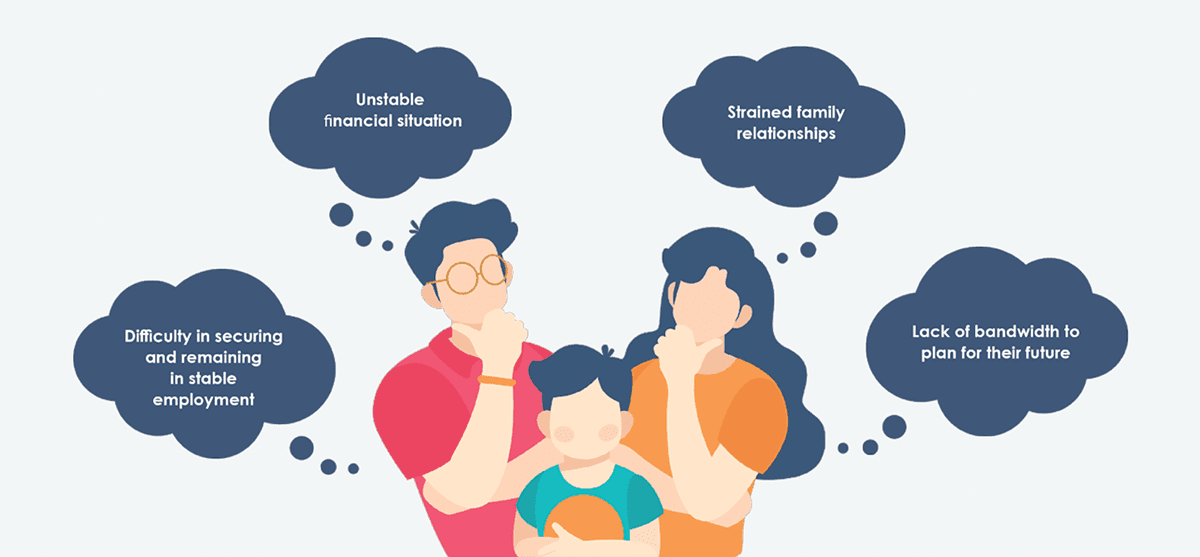Who are
Lower-Income Families?
Lower-Income Families come from diverse backgrounds and have had unique life experiences resulting in their current situations. Due to these differences, it’s difficult to provide a singular empirical definition of this group.
Different government schemes utilise gross income or per capita income as an eligibility criteria. These include:
| Name of Initiative | Example of Income-Related Eligibility |
|---|---|
| ComCare Short-to-Medium-Term Assistance (SMTA)1 | ≤ $650 monthly household income per capita per month or monthly total household income of ≤ 1.9k per month* |
| Medishield subsidies for Lower-income households2 | ≤ $1,200 household monthly income per person |
| Progressive wage model for full-time lowerwage workers3 | ≤ $2,200 per month |
Colabs’ insights on Lower-Income Families aim to include a wider range of families that struggle to improve their circumstances, although they may not meet those schemes’ income criteria.
“I was quite well-to-do in the past. However, I had a surgery due to health reasons and I went out of business. A lot of bad things happened. I became very poor and had to give up everything. I had no choice but to seek help.”
— Lived experience of a lower-income singaporean
This story reflects the reality of Lower-Income Families: their situation stems from a complex web of different factors. The problem goes beyond finances, so the solution must do the same. Solving issues in one aspect of life requires solving many others by taking a holistic approach.
Lower-Income Families are families who are susceptible to shocks due to lack of financial resources and support networks, even if they may earn more than the stipulated income for Low-Income Families.
Due to a mix of circumstances, Lower-Income Families struggle with a myriad of overlapping issues. External shocks and internal circumstances combine to create an overwhelming web of factors, undermining the ability for families and individuals to mitigate their situation.4
This translates into Lower-Income Families often having insufficient capacity to improve their circumstances on their own. Some families may also be ineligible for government assistance and are unable to receive the support they need.
“Any society which has been stable for a long time tends to stratify and become less socially mobile...We must deal with this challenge, or we risk becoming more stratified and unequal as a society, with a permanent underclass unable to progress.”
But achieving upward social mobility is getting harder, especially for vulnerable groups like Lower-Income Families. With their limited financial resources, Lower-Income Families are more vulnerable to unexpected events. They’re less able to cope and recover when unexpected situations occur, like hospitalisation, the death of an income earner, a recession, or a pandemic.
Achieving social mobility
Social mobility is a broad term referring to a movement of individuals or groups in social position over time. Social mobility may measure health status, literacy or education but more commonly refers to changes in income.6
Why and how has social mobility changed over time?
Singaporeans face an increased difficulty in achieving inclusive growth and maintaining high social mobility.
Early signs of deepening social stratification have become more visible. For example, in the past we mostly had older folks staying in rental flats; nowadays we see more families with young children staying in these flats, and many stay for several years or more.7 If we don’t face these issues now, the social and financial gap will continue to grow. This could seriously threaten our social compact.
To find out more about the Lower-Income Families Colabs Executive Summary, share input, or discover more ways to help, email us at [email protected].
To download the Lower-Income Families Executive Summary, click here.
References
- “Comcare Short-to-Medium-Term Assistance,” Support GoWhere, accessed May 15, 2023, https://supportgowhere.life.gov.sg/schemes/COMCARE-SMTA/comcare-short-to-medium-termassistance-smta.
- “Medishield Life Premiums and Subsidies,” Ministry of Health, accessed May 15, 2023, https://www.moh.gov.sg/healthcare-schemes-subsidies/medishield-life/medishield-life-premiumsand-subsidies.
- “Progressive Wage Moves from 1 Sep,” Ministry of Manpower Singapore, September 31, 2022, https://www.mom.gov.sg/newsroom/press-releases/2022/0831-progressive-wage-movesfrom-1-sep;
- Jeffrey Alwang, Paul B. Siegel , and Steen L. Jorgensen, “Vulnerability: A View from Different Disciplines,” World Bank, Social Protection, June 2001, https://documents.worldbank.org/curated/en/636921468765021121/pdf/multi0page.pdf
- Lawrence Wong, “Speech by Deputy Prime Minister and Minister for Finance Lawrence Wong at The Forward Singapore Conversation with Social Sector Practitioners on 10 October 2022, at Lifelong Learning Institute Lecture Theatre,” Ministry of Finance Singapore, October 10, 2022, https://www.mof.gov.sg/news-publications/speeches/speech-by-deputy-prime-ministerand-minister-for-finance-lawrence-wong-at-the-forward-singapore-conversation-with-social-sector-practitioners-on-10-october-2022-at-lifelong-learning-institute-lecture-theatre.
- Libretexts, “Types of Social Mobility,” Social Sci LibreTexts, December 16, 2020, https://socialsci.libretexts.org/Bookshelves/Sociology/Introduction_to_Sociology/Sociology_(Boundless)/09%3A_Stratification_Inequality_and_Social_Class_in_the_U.S./9.04%3A_Social_Mobility/9.4D%3A_Types_of_Social_Mobility.
- Tharman Shanmugaratnam, “The Economic Society of Singapore SG50 Distinguished Lecture by Deputy Prime Minister and Minister for Finance Tharman Shanmugaratnam,” MOF, August 14, 2015, https://www.mof.gov.sg/news-publications/speeches/The-Economic-Society-of-Singapore-SG50-Distinguished-Lecture-by-Deputy-Prime-Minister-and-Minister-for-Finance-Tharman-Shanmugaratnam.
- Lawrence Wong, “Speech by Deputy Prime Minister and Minister for Finance Lawrence Wong at The Forward Singapore Conversation with Social Sector Practitioners on 10 October 2022, at Lifelong Learning Institute Lecture Theatre,” Ministry of Finance Singapore, October 10, 2022, https://www.mof.gov.sg/news-publications/speeches/speech-by-deputy-prime-ministerand-minister-for-finance-lawrence-wong-at-the-forward-singapore-conversation-with-social-sector-practitioners-on-10-october-2022-at-lifelong-learning-institute-lecture-theatre























